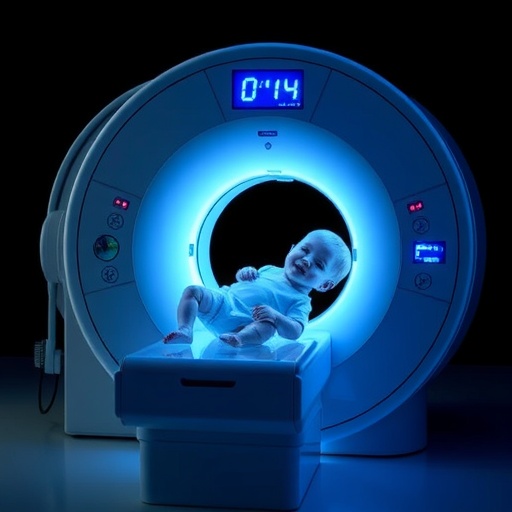Recent advancements in medical imaging technology have reached a significant milestone with the introduction of a revolutionary approach to magnetic resonance imaging (MRI) in infants. The research led by Rhee et al., published in the journal Pediatric Radiology, showcases a ground-breaking application of deep learning techniques to enhance zero echo time (ZTE) MRI. This innovative method aims to provide accurate and high-quality brain imaging for infants without the need for sedation, marking a major breakthrough in pediatric radiology and neuroimaging.
Traditionally, MRI scans in infants have posed considerable challenges, predominantly due to their inability to remain still during the procedure. This has often necessitated sedation or anesthesia, presenting inherent risks and logistical difficulties. The newly proposed deep learning-enhanced ZTE MRI circumvents these obstacles by enabling the acquisition of high-fidelity images while the child remains awake, thus reducing any associated risks.
The essence of the zero echo time technique lies in its ability to capture rapid imaging sequences that are less susceptible to motion artifacts, thus significantly improving the quality of the resultant images. This is particularly advantageous in pediatric patients, where even the slightest movement can compromise the accuracy of the scan. By leveraging deep learning algorithms, the researchers have been able to refine and optimize the imaging process, resulting in clarity and detail that were previously unattainable.
Deep learning has made strides across various domains, with medical imaging being one of the most promising areas of application. In this study, the researchers integrated advanced machine learning methodologies to analyze imaging data and enhance the reconstruction process of MRI scans. The algorithms utilized can interpret and synthesize data in real-time, enabling practitioners to view high-quality images instantaneously, which is crucial in critical care settings.
Infants are unique in their developmental stage; their brains are rapidly evolving, and any underlying conditions often require prompt diagnosis for effective intervention. The ability to conduct MRI scans without sedation opens up new avenues for timely detection of neurological issues, allowing for better management and treatment plans tailored to early childhood development needs. Such timely interventions can have profound implications for long-term outcomes in pediatric patients.
The research team conducted extensive trials to validate the efficacy and safety of their deep learning-enhanced ZTE MRI. Their results showed significant improvements in image quality and diagnostic accuracy when compared to conventional imaging techniques. By employing a novel approach that optimally combines deep learning with advanced MRI technology, the team demonstrated the potential for significant enhancements in pediatric imaging capabilities.
Furthermore, the implications of this study extend beyond just infant imaging; it paves the way for the adoption of similar methodologies in other branches of medical imaging involving pediatric patients. The versatility of deep learning lends itself well to various forms of diagnostic imaging, including but not limited to, computed tomography (CT) and ultrasound. The successful implementation of this deep learning-enhanced technique could lead to widespread adoption and adaptation across the medical field, revolutionizing the way pediatric imaging is approached.
In addition to improving the safety and comfort of the imaging process, this innovation has the potential to reduce overall healthcare costs and resource usage. By minimizing the need for sedation, healthcare providers can allocate resources more efficiently and reduce the potential for complications related to anesthesia. Consequently, this approach could contribute significantly to optimizing care pathways in pediatric radiology.
Moreover, this study underscores the importance of collaborative and interdisciplinary research. The integration of expertise from machine learning, radiology, and pediatric care illustrates how scientific collaboration can drive medical advancements. As researchers continue to refine and enhance these methodologies, the focus should remain on fostering partnerships that bridge the gap between technology and clinical application.
As the medical community looks forward to integrating these advanced imaging techniques into routine practice, it becomes evident that this research represents a pivotal moment in pediatric healthcare. It embodies the convergence of cutting-edge technology and compassionate care, illustrating that innovation can significantly impact the wellbeing of the youngest patients.
In conclusion, the introduction of deep learning-enhanced zero echo time MRI for infants without sedation marks a seminal achievement in pediatric radiology. This revolutionary technique not only enhances the imaging quality but also prioritizes the safety and comfort of young patients. As further studies and clinical trials expand on these findings, the expectation is not just for improved diagnostic processes but for a complete transformation in the paradigm of pediatric healthcare.
The future is bright for pediatric imaging, with advancements such as this setting the stage for improved outcomes and enhanced healthcare experiences for children and their families. The journey from innovation to application may be accelerated by this research’s success, promising a new era of non-invasive diagnostic techniques that will ultimately shape the landscape of pediatric medicine in the years to come.
Subject of Research: Magnetic resonance imaging in infants
Article Title: Deep learning-enhanced zero echo time silent brain magnetic resonance imaging in infants without sedation
Article References:
Rhee, C., Hwang, JY., Choi, J. et al. Deep learning-enhanced zero echo time silent brain magnetic resonance imaging in infants without sedation.
Pediatr Radiol (2025). https://doi.org/10.1007/s00247-025-06413-0
Image Credits: AI Generated
DOI: 10.1007/s00247-025-06413-0
Keywords: MRI, Deep Learning, Pediatric Radiology, Infant Imaging, Sedation-Free
Tags: brain imaging techniques for infantsdeep learning applications in healthcaredeep learning in medical imaginghigh-quality brain imaging for childreninfant MRI challengesinnovative imaging technologies in pediatricsmotion artifact reduction in MRIneuroimaging without anesthesiapediatric radiology advancementssafety in pediatric imagingsedation-free MRI for infantszero echo time MRI technique





